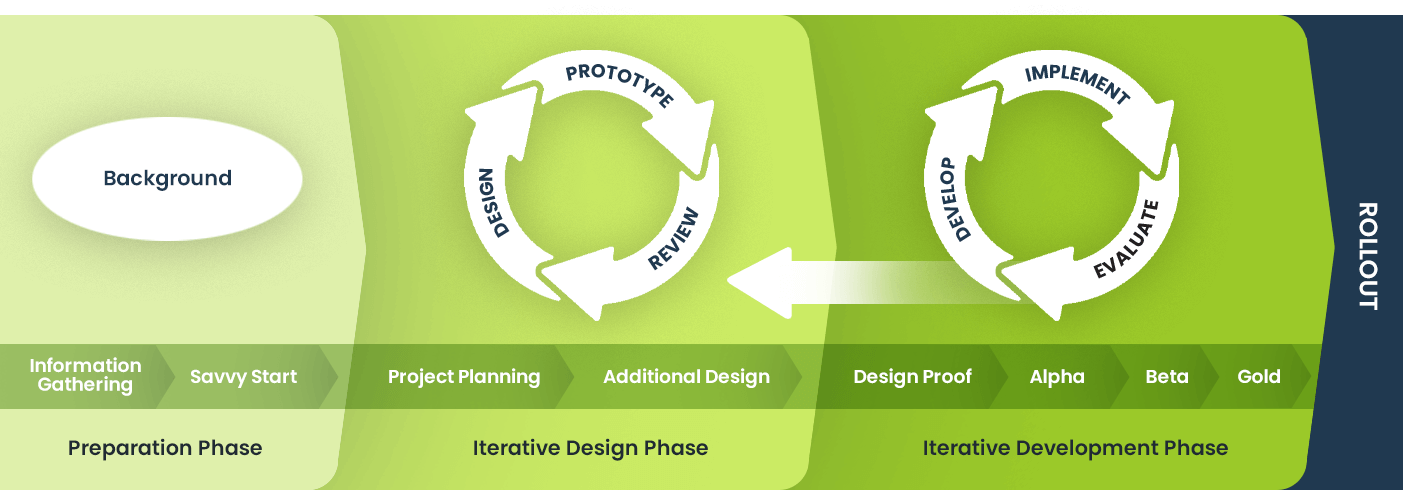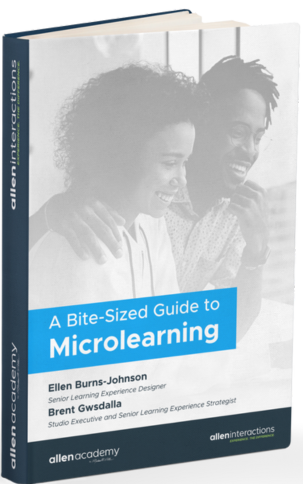Process
An Iterative Approach
Designing and developing learning experiences that resonate with your audience is no easy feat. For them to be impactful and memorable, you must first consider and address a wide range of factors, such as the learners’ personality and skill sets, the behaviors to be learned, the channels available to learners, and much more.
The Successive Approximation Model (SAM)
Designed to set a defined and manageable framework while also inspiring creativity and experimentation, the Successive Approximation Model, or SAM, is an agile model for experience development. The model takes small, purposeful steps to facilitate frequent analysis and evaluation, identify alternatives, keep clients involved and informed, and achieve consensus early before modifications become prohibitively expensive.

The SAM model focuses on 3 key phases:
Preparation
The preparation phase of the SAM model is focused largely on information gathering. This includes a thorough examination of the skills or tasks to be learned, the people doing the learning, the available learning delivery channels, and the indicators that will be used to measure success. We look at what may have been tried in the past and lessons learned from successes and disappointments. We identify key stakeholders and identify roles they wish to play. The preparation phase is crucial to setting the foundation for the project.
Iterative Design
During the iterative design phase, the overall sequence and structure of the learning experience is defined. Interactions are prototyped to a level sufficient for stakeholders to evaluate design ideas before media, text, and software are fully developed, polished, and finalized. The design phase also includes the identification of the delivery channel and technology to be used.
Iterative Development
With design in hand, the work turns to the iterative development phase. At this point, a “Design Proof” is produced at full fidelity to verify style, technology, and usability by representative learners. Approval at this point launches iterative development for the remainder of the content. An “alpha” version containing all intended content is produced and checked for omissions and errors. If any are found, a “beta” version is produced as a candidate for “gold” rollout.
It’s important to note that SAM is a fluid and iterative model. Few learning experiences are perfected quickly in a “once and done” fashion. As a practical model that also assures quality and creativity, its planned and budgeted iterative nature ensures “in scope” refinement and optimal uses of time and resources.

Download Our Bite-Sized Guide to Microlearning eBook
Insights Into What Makes for Successful Microlearning
In the spirit of making “short and sweet” learning content, this e-book is organized into short sections, each independent of one another. You can read the sections in order, read them out of sequence, or only read some sections. Each provides a foundation of knowledge in the following topics:
- Is microlearning a good fit for your organization?
- Delivering microlearning
- Planning a curriculum with microlearning
- Designing good microlearning experiences
Download the eBook by clicking on button below!
Featured Case Study

Mary Kay Case Study
Mary Kay Revolutionizes Onboarding
Mary Kay, a leading multi-level marketing company in the beauty industry, needed a method for training beauty consultants with diverse needs and definitions of success. As the sixth-largest network marketing company globally, Mary Kay had over 3.5 million independent beauty consultants in more than 35 countries, each with unique training program requirements.
Using a microlearning approach crafted by Allen Interactions for customer-centric training, Mary Kay now offers a truly personalized, self-paced, and self-directed learning environment for onboarding their beauty sales consultants.
After trusting Allen Interactions with their training needs, the company experienced the following:
90% engagement level
80% of beauty consultants complete the program
3.5 million learners (Beauty Consultants)
